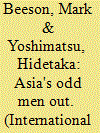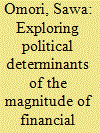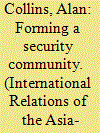|
|
|
Sort Order |
|
|
|
Items / Page
|
|
|
|
|
|
|
| Srl | Item |
| 1 |
ID:
077593


|
|
|
|
|
| Publication |
2007.
|
| Summary/Abstract |
Australia and Japan have frequently had difficult relationships with their neighbours. This paper suggests that when seen in their specific historical contexts, the fact that Australia and Japan have become 'Asia's odd men out' is unsurprising. The central argument of this paper is that the consolidation and institutionalisation of regions is in large part a political exercise that reflects, and is informed by, discrete national conversations. Until and unless such national discourses align with wider transnational developments, regional processes are unlikely to prosper. An examination of Japan's and Australia's respective attempts to engage with and define their region reveals just how problematic this process can be
|
|
|
|
|
|
|
|
|
|
|
|
|
|
|
|
| 2 |
ID:
077590


|
|
|
|
|
| Publication |
2007.
|
| Summary/Abstract |
The issues of China's nuclear command, control and operations are a secret dominion and lack serious discussions due to the dearth of available literature. In this article, the author argues that China's command, control and communications systems suffer technological problems, despite the efforts being made. Owing to technological progress, China's strategic and tactical nuclear targetting plans are versatile, but its current striking capability is insufficient. The potential use of tactical nuclear weapons, which China has been developing for decades, could contradict China's no first use commitment. In a nutshell, the author is convinced that China's nuclear posture is more aggressive than its oft-cited policies, and the Chinese are constantly preparing for a more offensive nuclear posture against other nuclear powers, although China's nuclear operational capability is still far behind
|
|
|
|
|
|
|
|
|
|
|
|
|
|
|
|
| 3 |
ID:
077594


|
|
|
|
|
| Publication |
2007.
|
| Summary/Abstract |
This paper aims to empirically explore political determinants of the magnitude of financial reforms, namely, under which conditions a country is more likely to choose a 'big-bang' type of financial reform versus a gradual financial reform. Especially, how the International Monetary Fund's (IMF's) effect on the magnitude of financial reforms is conditioned by political institutions is quantitatively examined using 30 developing countries' data from 1973 to 2002. Results demonstrate that the IMF's effect on facilitating a big-bang type of financial reforms is contingent upon the number of veto players in the case of a democratic government. Also, a non-democratic government is more likely to engage in big-bang type of financial reforms than a democratic government, holding other conditions constant
|
|
|
|
|
|
|
|
|
|
|
|
|
|
|
|
| 4 |
ID:
077592


|
|
|
|
|
| Publication |
2007.
|
| Summary/Abstract |
At its Ninth Summit in October 2003 the Association of South East Asian Nations (ASEAN) announced its intention to create an ASEAN Community based upon three pillars: ASEAN Economic Community, ASEAN Security Community and an ASEAN Socio-Cultural Community. A year later ASEAN established the Vientiane Action Programme to realise this goal. The official discourse of community building is complemented by a vibrant academic debate over whether ASEAN's norms indicate that it is a nascent security community ready to transform itself into a fully-fledged security community. In this article I argue that ASEAN has never been a nascent security community but has instead been a security regime and therefore its norm compliance does not provide evidence of community building. If ASEAN is to form a security community then new socialising norms will need to emerge, which will need to include the active involvement of regional civil society organisations in order to bring plurality to ASEAN decision making. Only then will the people of ASEAN be able to take ownership of the community building process.
|
|
|
|
|
|
|
|
|
|
|
|
|
|
|
|
| 5 |
ID:
077589


|
|
|
|
|
| Publication |
2007.
|
| Summary/Abstract |
This paper investigates how North Korean behaviour towards both the United States and South Korea is influenced by the popularity of the American President. The study applies theories relating to strategic conflict avoidance and signalling to suggest that the American President is able to demonstrate a willingness to use force when he is unpopular and as such is better able to coerce Pyongyang. Using a time-series model, I demonstrate that the North Koreans become more cooperative towards the United States in response to decreases in presidential popularity and increasing levels of US inflation. However, the study also shows that the North Koreans do not alter their behaviour towards the South Koreans in response to low American President Popularity ratings. The research, therefore, suggests that the North Koreans believe that the United States would be unable to launch a diversionary attack in response to North Korean behaviour towards the South. This study provides a clear support for the strategic avoidance of conflict hypothesis and suggests that the American Presidents are best able to coerce North Korea when they are unpopular at home
|
|
|
|
|
|
|
|
|
|
|
|
|
|
|
|
| 6 |
ID:
077591


|
|
|
|
|
| Publication |
2007.
|
| Summary/Abstract |
Why do states join US-led military coalitions? The war/dispute-diffusion literature suggests that opportunity and willingness are crucial determinants of coalition participation (Siverson and Starr, 1990, 1991). A state joins a coalition if it has a strong interest in war and enough capability to send armed forces abroad. Alliance studies connect coalition participation problems with the reliability of allied countries (Leeds, 2003; Gartzke and Gleditsch, 2004). These studies seem to provide a fairly good picture on the question; however, they are not free of problems. In particular, they study only coalitions for interstate war and militarized disputes but ignore coalitions for other purposes. Coalitions can be formed for military operations other than war (Kober, 2002). There are coalitions for humanitarian intervention, peacekeeping, and even for the evacuation of noncombatants. This article shows how difference in operation-types and collective legitimacy affect the decision of a state to participate in US-led coalitions. A coalition with United Nations' authorization may appear to be a legitimate international 'police' act and attract more partner states. A coalition for intervention into domestic affairs may be less attractive to possible participants because of the violation of the noninterference norm of international law. Statistical analysis on United States coalition partners from 1950 to 1999 suggests that how and for what purposes coalitions are formed cannot be overlooked. Coalition participation is not fully explained by the existing perspectives found in war/dispute-diffusion literature and alliance studies, and there is a need to invoke 'the compulsion of the coalition's missions and legitimacy'
|
|
|
|
|
|
|
|
|
|
|
|
|
|
|
|
|
|
|
|
|